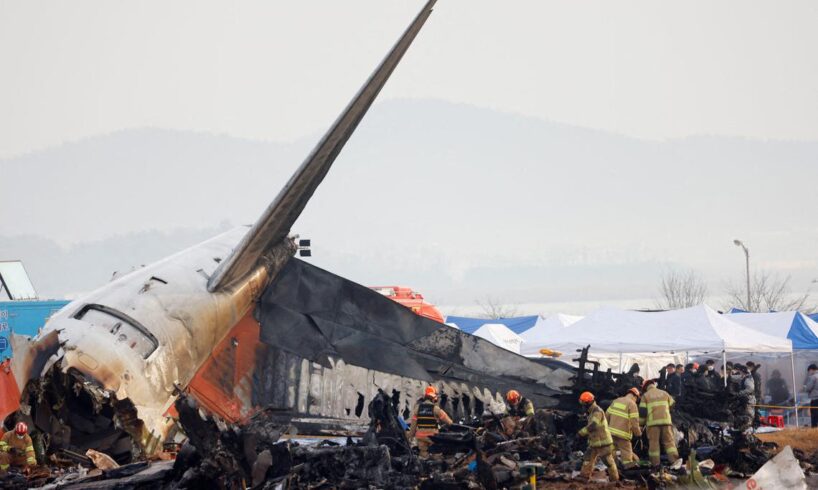
SEOUL – The South Korea-led investigation into Jeju Air’s fatal plane crash in December 2024 has clear evidence that pilots shut off the less-damaged engine after a bird strike, said a source with knowledge of the probe.
The source on July 21 said the evidence – including the cockpit voice recorder, computer data and a physical engine switch found in the wreckage – showed that pilots shut off the left engine instead of the one on the right when taking emergency steps after a bird strike, just before it was scheduled to land.
The source was speaking on condition of anonymity because investigators have not released an official report including this evidence.
A government source said examinations of the plane’s recovered engines found that no defects had been present before the bird strike and crash.
The Boeing 737-800 jet crashed on Dec 29 crash at Muan Airport and killed all but two of the 181 passengers and crew members on board – the deadliest air disaster on South Korean soil.
Investigators told victims’ family members at a briefing on July 19 that the right engine had been more severely damaged by a bird strike than the left, and there was circumstantial evidence that pilots had turned off the less-damaged left engine, according to a third source who was at the briefing.
South Korean media outlets including MBN and Yonhap reported that information on July 19 and 20.
The South Korean Aviation and Railway Accident Investigation Board, which is leading the investigation, did not respond immediately to a request for comment.
Boeing referred questions about the crash to the board. Engine maker CFM International, a joint venture between GE Aerospace and France’s Safran, did not immediately respond to a request for comment.
Jeju Air said it was actively cooperating with the board’s investigation and awaiting the official announcement of the results.
Most air crashes are caused by multiple factors, and under international rules, a final report is expected within a year of an accident.
A preliminary report released in January 2025 said
duck remains were found in both engines of the Jeju Air plane
after the flight from Bangkok crashed at Muan Airport, but it did not give details about the extent of remains or damage found in each engine.
South Korea’s investigation body on July 19
cancelled a planned release to media
of an update on what is known so far about the engines.
Families of the crash victims were briefed on the report ahead of its planned release, but objected to its publication, saying that it appeared to apportion blame to the pilots without exploring other contributing factors, lawyers representing the families said.
The Jeju Air flight overshot Muan Airport’s runway as it made an emergency belly landing and crashed into an embankment containing navigation equipment, leading to a fire and partial explosion.
Representatives of victims’ families and the Jeju Air pilots’ union said over the weekend that the investigation needs to also focus on the embankment, which aviation experts have said likely contributed to the high death toll.
The Jeju Air pilots’ union said the board was misleading the public by suggesting there was no problem with the left engine, given traces of bird remains were found in both engines.
The union accused the board of trying to make the pilots “scapegoats” by failing to provide scientific and technological grounds that the plane could have landed safely with only the left engine turned on.
Air accidents are complex incidents that occur due to a number of contributing factors, and investigators have not produced evidence so far to support the implication that the accident was a result of pilot error, the union said.
Investigators are so far “silent about organisational responsibility”, the union said.
A body representing bereaved families said in a statement there were some phrases related to the cause of the accident in the planned press release that could be interpreted as if a final conclusion had been reached, and all facts surrounding the incident must be clarified. REUTERS
South KoreaAir safetyAir crashes





